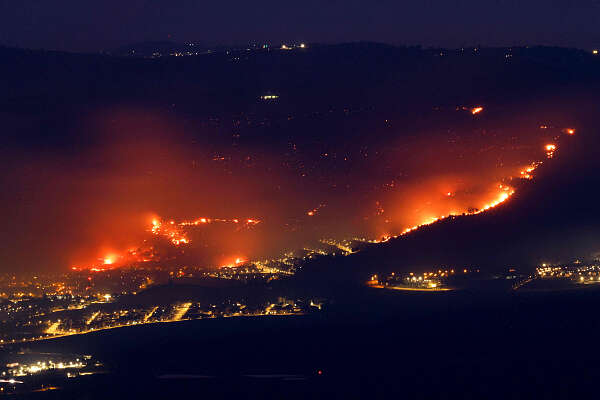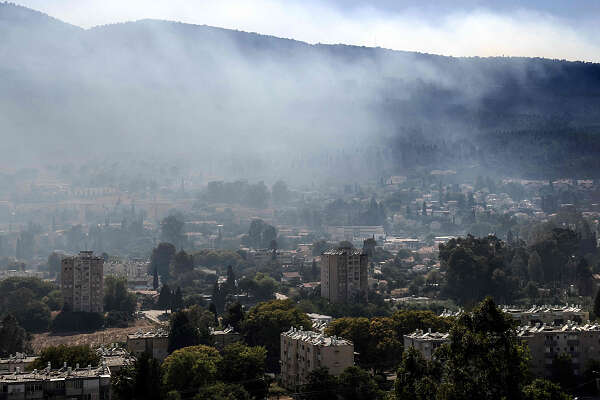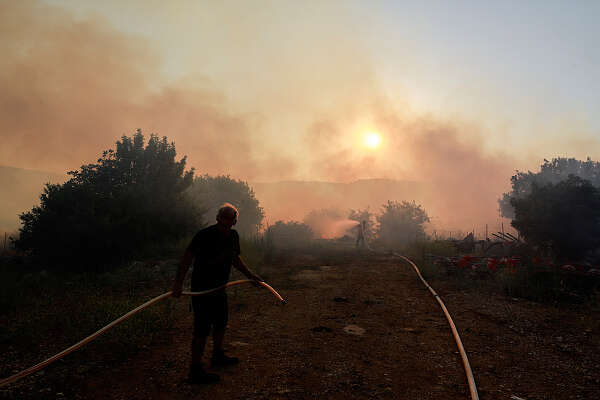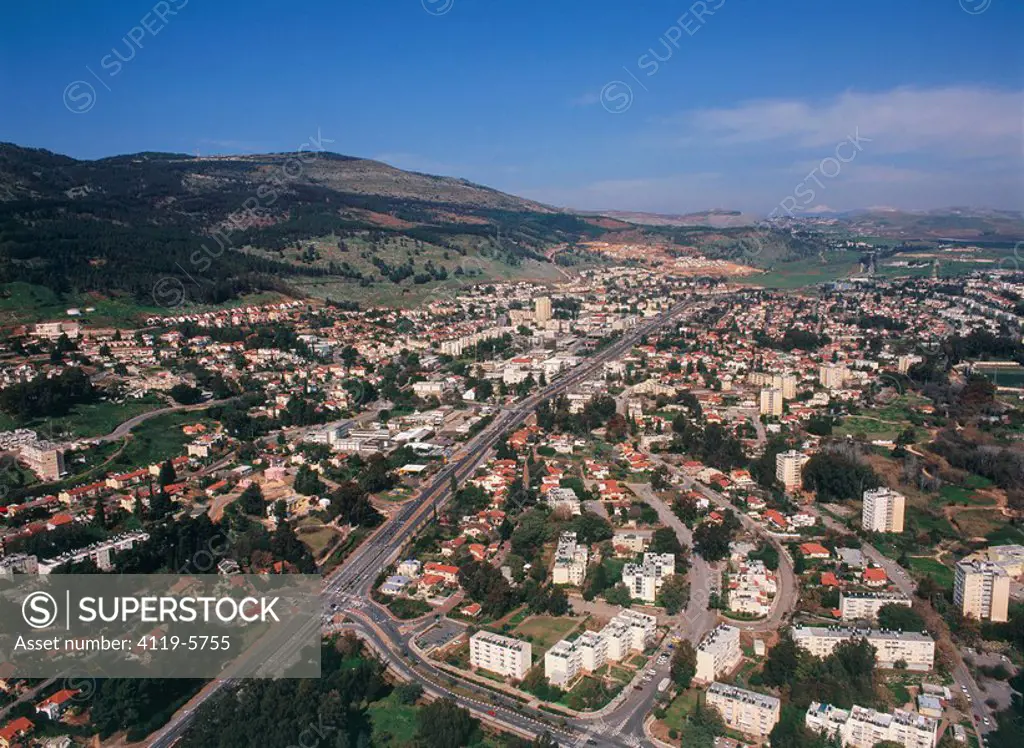The forgotten war zone
For nine months, Kiryat Shmona has stood as a ghost town, its residents among those displaced by relentless attacks from Hezbollah. Amidst this chaos and uncertainty, one woman's story stands out: Dr. Aviva Zrihan Weitzman.
Nathan J. Minsberg
Israel Hayom
Jul 3, 2024
Kiryat Shmona, a city of 23,000, has been turned into a ghost town
As of July 3, 2024, the northern front of Israel remains a volatile warzone, largely overlooked by international media. In the past week alone, Hezbollah has launched over 300 rockets into Israeli territory, resulting in 5 civilian deaths and dozens of injuries. The number of displaced Israelis from the north has now surpassed 70,000, with no clear timeline for their return. Despite diplomatic efforts, tensions continue to escalate, with the IDF reporting multiple thwarted infiltration attempts along the Lebanon border.
This latest escalation follows two devastating wars between Israel and Lebanon in 2006 and 2014, with Hezbollah, backed by Iran, growing increasingly powerful. The United Nations Interim Force in Lebanon (UNIFIL) has failed to prevent Hezbollah's entrenchment along the border, while the Israeli government's efforts to protect northern citizens both before and after October 7th have fallen short.
Kiryat Shmona, a city nestled in the awe-inspiring mountainous region of the western Hula Valley, now echoes with an eerie silence. For nine months, this once-thriving community has stood as a ghost town, its residents among those displaced by relentless attacks from Hezbollah. Amidst this chaos and uncertainty, one woman's story of resilience and unwavering commitment to her community stands out: Dr. Aviva Zrihan Weitzman.

Fires burn as a result of rockets launched from Lebanon into northern Israel, next to the city of Kiryat Shmona.
Aviva is no stranger to the challenges faced by the residents of Kiryat Shmona. With a Ph.D. in Social Work from the University of Haifa, she has dedicated her career to serving the community as a social welfare worker, educator, and researcher. Since 2009, Aviva has been a lecturer in the Department of Social Work at Tel-Hai College, where she has played a vital role in educating the next generation of social workers and fostering cooperation with the region's population through student field training, supervision, and joint community projects.
"I decided to pursue studies in social work for a reason," Aviva explains. "I believe that in urgent crisis situations, one must continue to act and not panic. I do everything I can for the community, from food logistics to bringing people into housing. My whole time before October 7th was dedicated to bettering the community and the people around me, so I was prepared to do this the second everything happened."
As Head of the Field Studies Unit at Tel-Hai College, Aviva coordinates volunteering efforts that have become a lifeline for the beleaguered northern region. Her research into domestic violence, stress, trauma, and resiliency has taken on new urgency in the face of the ongoing conflict.
"My education and love for the northern hillside have kept me in the periphery, even though my brothers left," she continues. "My professional and personal DNA is to always fight, no matter if it's war or career. It's been a crazy intense year, but I feel fulfilled that I am doing things that matter, touching people's lives and making them better through efficient projects."
A family with no home
For Aviva, a mother of four, the past nine months have been a relentless struggle to maintain a semblance of normalcy for her family. The Weitzman family, like countless others from Kiryat Shmona, now calls a Tel Aviv hotel room home - a far cry from the comfort of their northern abode.
In their cramped quarters, the absence of a kitchen means family meals are often hurried affairs in the hotel's crowded dining room. The toll of this prolonged upheaval is etched on the faces of Aviva's children, their education disrupted, their routines shattered.
"Nevo, my eldest son, just finished his service and saw some horrific things in Gaza," Aviva shares, her voice catching slightly. "He's flying to a far away destination to take his mind off it all, like many in Israel do after they finish the army to heal their wounds from defending our country. He'll probably return to fight as a reservist, but the thought of him potentially fighting this time in his own backyard, in the north against Hezbollah... it's almost too much for a mother to bear."
The forgotten war zone: A cry for recognition and support
As tensions escalate along the Israel-Lebanon border, with over 7,400 rockets, kamikaze drones, missiles, artillery, and ground infiltrations fired by Hezbollah at Israel since October 7th, Aviva fears that Kiryat Shmona teeters on the brink of an even greater catastrophe. The world's attention, she worries, has turned away from the suffering of northern Israel's citizens.
"The attention was almost never there throughout this war. That's the thing that is so shocking," Aviva laments. "Even within Israel, the media doesn't show what's happening in the north. The north doesn't have a unified voice in the government or geographically. We're a patchwork of communities - Jews, Muslims, Christians, Druze, Bedouins - spread across villages, kibbutzim, towns, and cities. This diversity, which should be our strength, makes it hard to advocate for our collective needs."
Aviva and her neighbors feel their panic and stress are not fully comprehended by other Israelis who don't live on the border. With a diplomatic resolution, which seems unlikely at present, trust in the government to ensure their safety remains tenuous at best.
Moreover, the government has no plan for how to bring back life and commerce to the north. The short-term need is to return safety so people can return to fix the issues that existed before the war.
A nation's anguish
Amidst the chaos, the plight of over 120 Israeli hostages held by Hamas in Gaza has become a symbol of the nation's collective pain. The Hostages and Missing Families Forum works tirelessly to secure the hostages' release and support their families. Weekly rallies in Tel Aviv serve as a powerful reminder that the hostages are not forgotten.
However, Aviva believes that while fighting for the hostages' return is crucial, in parallel, we should also fight for the displaced and their return to the south and the north. "What nation do we have if we cut off its northern and southern points?" she asks. "The north doesn't have a voice in the government, but also in the way geographically the communities are a lot of small and disparate ones. At least with the hostage campaign, they are relentless. Maybe we need to be more like this."
The political divide
Over the past nine months, Aviva's perspective has shifted dramatically. "I have been confused since October 7th," she admits. "I can't believe Israel has arrived to this state. While I don't want to blame one singular leader, I believe there are many mistakes over many years that have led to this point."
Her words reflect the sentiments of many Israelis caught in an increasingly polarized political landscape. "I see commonality between the sides, but the aggressiveness with which the left is blaming the right and not understanding that by doing so, it is pushing the people of the periphery, who usually vote more on the right, even further away," Aviva explains. "By doing exactly what the international world is doing to Israel by collectively blaming us all for our government's actions, here too in Israel, the left is blaming rather than aiming to speak the language of the right and the periphery."

Smoke billows as a result of rockets launched from Lebanon into northern Israel, next to the city of Kiryat Shmona by the border with Lebanon,
She continues, "I also believe this government is wrong and has wronged us, but in order for us all to unite, we must realize that we all want the same basic things of security and the ability to live in the entire country no matter where. We must find a calm, community-based, social-work way to speak to one another - those protesting in Kaplan and those protesting for their return to the North. We are all wanting a safer Israel, the hostages home at once, and new leadership to bring hope. But we cannot just blame one man. Many are wrong."
This sentiment is encapsulated in the slogan seen on billboards across Israel: "ביבי אתה הראש אתה אשם" ("Bibi, you are the head, you are guilty"). Aviva sees this as an example of the left collectively blaming Netanyahu and his entire camp, much like how the international community often blames all Israelis for their government's actions. She emphasizes that the responsibility lies not with one man or one side, but with everyone - the left, the right, the army, the generals, the politicians, and the citizens.
A call for action
As an experienced community leader, Aviva recognizes the importance of international support to end the conflict and allow northern residents to return home safely.
"Israeli leadership must bring security back and implement projects to bring young families to the north," Aviva states emphatically. "We need to push Hezbollah away from the border. A breach in the north could be even more devastating than what happened in the south."
Regarding the American government's role, Aviva is pragmatic. "I don't expect others, not even the Americans, to defend Israel. We must defend ourselves. But we do expect full backing from America for the process Israel is going through to ensure its security."
A personal encounter
I first met Aviva and her family in October 2023, when I arrived in northern Israel as a field producer for international news agencies. In the early days of the war, with no place to stay, my crew and I found shelter with the Weitzmans. Despite their home, town, and region being under constant rocket fire, Aviva, her husband Nissim, and their children welcomed us like family.
It was during those weeks spent in their Kiryat Shmona home that I witnessed firsthand the gravity of the situation in the north. Beyond the endless rocket attacks hitting residential neighborhoods, I saw how the narrative focused on the south, leaving the displaced residents of the north largely forgotten by the news, the government, and the world.

A man holds a hose, as another person uses a hose to extinguish flames, amid ongoing cross-border hostilities between Hezbollah and Israeli forces, in Dishon, near Kiryat Shmona, northern Israel.
Immediately after the October 7th attacks, rather than fleeing to safety, the Weitzmans chose to stay and help their community. Together with their neighbors, many of whom were elderly, disabled, or unable to leave, they opened a civilian "war room." Aviva and her family cooked thousands of meals for soldiers abandoned by the government, provided essential supplies, and worked tirelessly to support the residents of Kiryat Shmona and the surrounding communities.
As a field producer, I witnessed firsthand the lack of international media coverage on the plight of northern Israel. While Gaza dominated headlines, the suffering of Israeli civilians in the north was largely ignored. Despite compelling stories of displacement, forest fires, and constant rocket attacks, major news networks remained largely silent on the anguish of Israel's northern residents. This silence stands in stark contrast to the coverage typically given to other conflict zones, raising questions about media bias and the complexities of reporting on Israel's vulnerabilities.
Dr. Aviva Zrihan Weitzman's story is a testament to the unbreakable bonds of family, community, and shared humanity in the face of unimaginable challenges. Her dedication to serving others, even as her own life has been upended by conflict, serves as an inspiration to us all.
Aviva's experiences reflect the complex realities faced by so many
caught in the crosshairs of war - realities that transcend political
divides and demand our collective attention and action. Her tireless
efforts to support those in need, to keep hope alive in the darkest of
times, remind us of our own capacity for resilience and the power of
compassion to light the way forward.

No comments:
Post a Comment